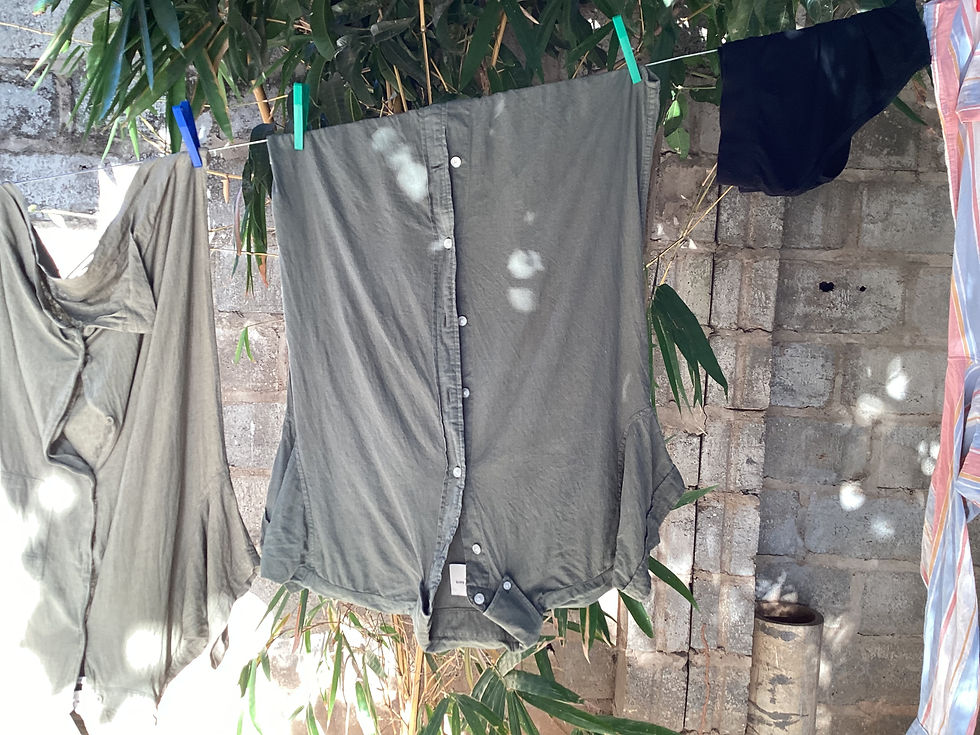ZAMBIA LETTERS, 6
- Ludvig Uhlbors
- 7 juni 2025
- 4 min läsning
Uppdaterat: 28 juni 2025

06/06/2025
Today we visited Dr. Gankhanani Moyo at his home. He is a performance artist with a PhD in literature who lectures on Intangible cultural heritage. UNESCO introduced the discipline in Zambia 2012 and since then Dr Gankhanani has motivated representatives of local cultures to appreciate their own cultural heritage. The background for his involvement is his personal experience of growing up as a member of the Tumbuka people. Historically, many Tumbukas have been ashamed of their language and felt uncomfortable using it in public. He employs Intangible cultural heritage as a discourse to turn such negative self-images around, not only within his own group but also in other groups all around Africa.
A large part of the thrust of Gankhanani´s criticism is directed against Christianity and Western missionary work. In this, he adressess the conflict between traditional knowledge systems and Christian condemnation of indigeneity. He also experiences corresponding problems when he lectures in Muslim countries.
During one such trip to Gambia he asked those he was lecturing to if there were any indigenous religions left in their country. “There is none,” they replied, “Because this is a Muslim country and it is not allowed, according to Islam. But it is everywhere.” He asked what that meant and they replied, “As soon as it gets dark, everyone slips out into the jungle, to the altars, and worships their gods.”
He speaks passionately about the differences between the views on nature in indigenous religions and Christianity. Included in his perspectives on this lies a criticism of monoteism and all pursuits of absolute truths. It becomes clear that to him this issue is strongly linked to empowerment. At one point he says that it is also linked to ”knowledge colonization”.
“Our culture is suffering from this knowledge from other cultures which oppresses the knowledge inherent in our culture. Any meaningful talk on a culture must come from its intangible culture. Don’t disregard the culture which is there”.
When we ask him to explain the concept of intangible culture more specifically, in terms of what it means to him, he describes it as the elusive culture, the one that is present in the body as a kind of tacit knowledge or that rests in skills that are passed on between people.
According to him, it constitutes the very glue in people’s ability to feel self-esteem and he perceives humans as collective beings, shaped primarily by the cultures we are part of. He also places great emphasis on the connection between a culture and the specificity of the nature which gave rise to it.
The oppression Gankhanani describes is also found in the relationship between different ethnic groups within Zambia. His own people, the Tumbuka, are dominated by the Chewa and the Chewa language is the official language in the region where both groups co-exists.
The central point of his message is that those who are on the inside of a culture should define it. Only they can decide whether their culture and its components have value. This is where the conflict with Christianity arises. According to him, all cultural practices have complexity. He advocates that one should not learn from books, but from knowledge that is conveyed.
In his understanding, cultures are connected to places and out of this connection specific medical knowledge arises. From this observation he goes on to make a series of statements about medicine and traditional knowledge where he sometimes equates such traditions with western medicine and western science.
His interest strikes me as local, so I ask him to what extent he sees more general patterns, historically and globally. Judging from his answer, I did not get the feeling that he has occupied himself much with such comparisons, nor that he sees much value in them. His perspective is African and Zambian.
In relationship to that, he makes the following statement: “I take the community as a starting point. No two communities are the same. Communities have a lot of power when they look at themselves from the inside. The ones who look at themselves with an outside lens are easily controlled. When a community asks itself what value it’s practices has, that is when it becomes empowered. My role, as someone with education, is to raise awareness within communities about their own worth.”
African cultures are being threatened by Western Christian missionary activity: “Christianity asks us to oppress ourselves, to deny ourselves. The idea that Zambia is a Christian nation is not the reality. Zambia is a multi-religious, multi-cultural nation. The only problem in Zambia is Christianity which wants to impose itself.”
He also explains some other values advocated by him. For example, he talks about the need to approach the unknown: “Being in a space you haven’t been before is growth. Leaving a position with privileges for a position that interests you is growth”. He continues along this line by giving examples of perspectives on gender found within indigenous cultures. He then compares them to more intolerant views inherent within Christianity.
Before we leave, Hanna and I ask him about his experience with mask. He says that masks are not a part of the culture he belongs to; Tumbuka. However, it has many traditions that involve dance, including a dance ritual called Vimbuza. It is a costumed dance that has medicinal effects and it is believed to be able to cure various diseases. He says that he and his company perform such dances outside their ritual context, as entertainment and as art, and he promises to invite us next time they arrange a performance.




Kommentarer